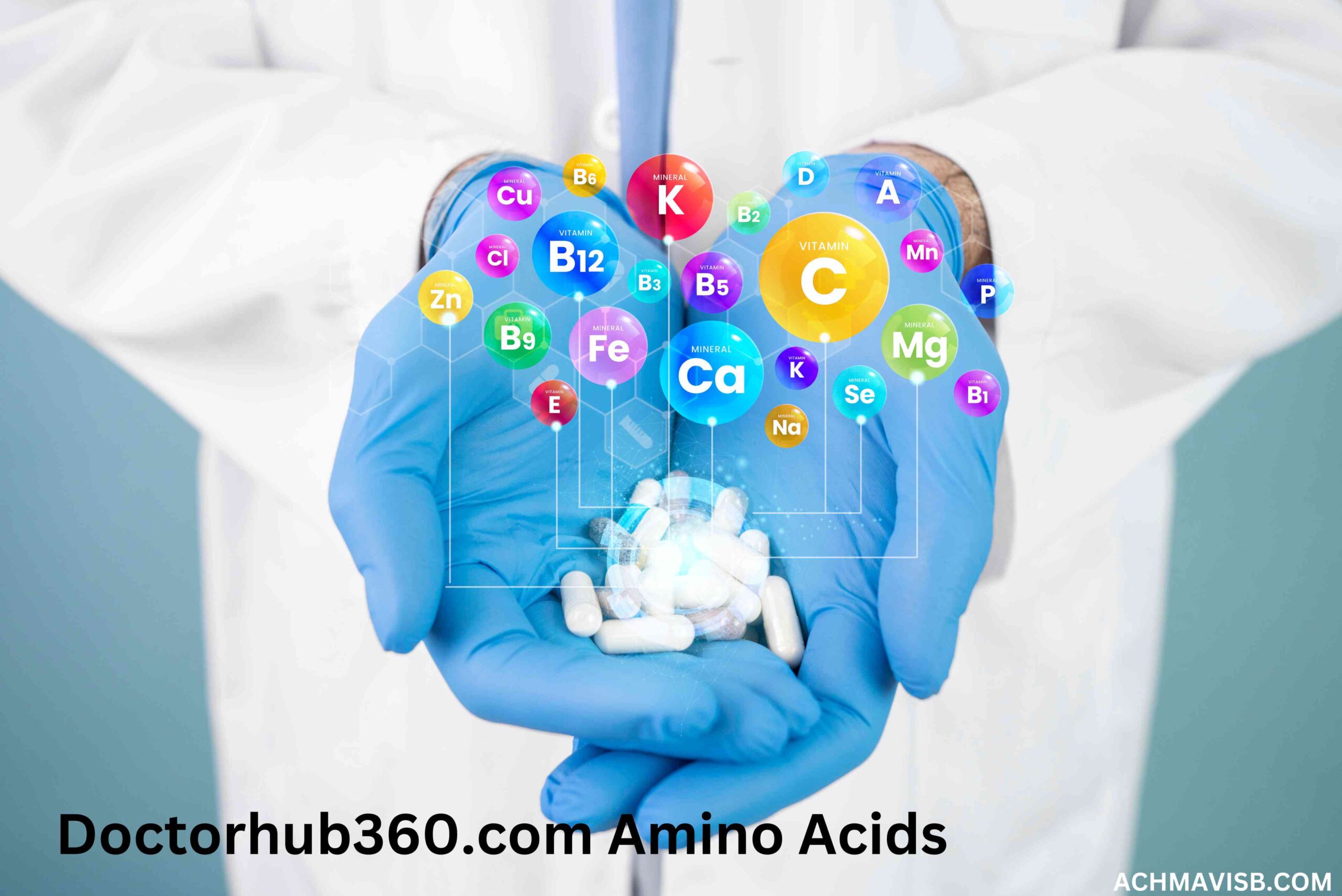Doctorhub360.com Amino Acids Importance in Health

Table of Contents
ToggleIntroduction
Have you ever wondered what keeps your body functioning like a well-oiled machine? Amino acids might not be the first thing that comes to mind, but they’re essential building blocks of life! Whether you’re an athlete, a busy professional, or just someone striving for better health, amino acids are crucial. At Doctorhub360.com Amino Acids understanding amino acids—and their importance—is our mission. Let’s dive into how these tiny molecules can make a massive difference in your health and vitality.
What Are Amino Acids?
Think of amino acids as the building blocks of protein—and life itself! They are organic compounds that combine to form proteins, which your body uses for almost everything, from building tissues to producing enzymes and hormones. Without amino acids, your body would struggle to function properly.
Types of Amino Acids
Amino acids fall into three categories:
- Essential Amino Acids: Must be obtained through diet.
- Non-Essential Amino Acids: Produced naturally by the body.
- Conditional Amino Acids: Required during illness or stress.
Let’s break these down further to understand their unique roles.
Essential Amino Acids
Your body can’t make essential amino acids, so you need to get them from food. These include:
- Leucine: Supports muscle growth and recovery.
- Lysine: Aids in calcium absorption and immunity.
- Phenylalanine: Precursor for neurotransmitters like dopamine.
Foods rich in essential amino acids include eggs, meat, and dairy products.
Non-Essential Amino Acids
Non-essential amino acids might sound less important, but they’re not. Your body can produce them, yet they’re vital for processes like tissue repair and immune function. Examples include:
- Alanine: Helps convert glucose into energy.
- Glutamine: Supports gut health and immunity.
These amino acids work behind the scenes to keep you healthy.
Role in Muscle Building
If you’re hitting the gym, amino acids are your best friends. They repair muscle fibers, reduce soreness, and enhance growth. Branched-Chain Amino Acids (BCAAs) like leucine, isoleucine, and valine are especially critical for athletes.
Amino Acids and Immunity
Did you know that amino acids play a significant role in your immune system? Glutamine, for example, fuels immune cells, while arginine helps in wound healing. A diet rich in amino acids ensures your body can fight off infections effectively.
Brain Health and Amino Acids
Your brain thrives on amino acids! Tyrosine and tryptophan are precursors to neurotransmitters like serotonin and dopamine, which influence mood, sleep, and focus. Feeling blue? Amino acids could be the natural boost you need.
Amino Acids in Food
Getting amino acids from natural sources is easy if you know where to look:
- Animal-Based Foods: Meat, fish, eggs, and dairy.
- Plant-Based Options: Quinoa, soy, lentils, and nuts.
A balanced diet ensures you get the full spectrum of amino acids your body needs.
Supplements: Do You Need Them?
Not everyone needs amino acid supplements, but they can be beneficial for certain groups:
- Athletes: To improve performance and recovery.
- Vegetarians/Vegans: To fill potential dietary gaps.
- Older Adults: To combat muscle loss with age.
Always consult a healthcare professional before starting any supplement regimen.
How to Incorporate Amino Acids into Your Diet
Here are some tips to boost your amino acid intake:
- Include a mix of plant and animal proteins in your meals.
- Opt for whole foods over processed options.
- Consider fortified foods or supplements if you have specific dietary restrictions.
Common Myths Debunked
Let’s clear up some misconceptions:
- Myth: Only meat provides amino acids. Fact: Plant-based sources are equally effective.
- Myth: Supplements are better than food. Fact: Whole foods are always the best source.
Doctorhub360.com: Your Trusted Source
At Doctorhub360.com, we’re committed to helping you understand the science of amino acids. Our resources are designed to empower you with knowledge, whether you’re a health enthusiast or someone just starting their wellness journey.
Real-Life Benefits of Amino Acids
Here are a few examples of how amino acids can transform your health:
- Increased Energy: Athletes report better endurance.
- Improved Recovery: Faster healing from injuries.
- Better Mood: Enhanced mental clarity and emotional well-being.
Risks of Amino Acid Deficiency
Lack of amino acids can lead to issues like:
- Muscle loss
- Weak immunity
- Mood disorders
A balanced diet is key to avoiding these problems.
Conclusion: The Power of Amino Acids
Amino acids are small but mighty. They’re the foundation of health, impacting everything from muscles to mood. With Doctorhub360.com, you have a partner in understanding and optimizing your amino acid intake. Start prioritizing your health today by making amino acids a central part of your diet.
FAQs
1. What are amino acids, and why are they important? Amino acids are the building blocks of protein. They’re essential for various bodily functions, including muscle repair, immunity, and brain health.
2. Can I get all the amino acids I need from a vegetarian diet? Yes, plant-based sources like quinoa, soy, and lentils provide all essential amino acids. Combining different plant proteins can also help.
3. Who benefits the most from amino acid supplements? Athletes, older adults, and those with dietary restrictions may benefit most. However, supplements should complement, not replace, a healthy diet.
4. What happens if I don’t get enough amino acids? Deficiency can lead to muscle loss, weak immunity, and mood changes. Eating a balanced diet is crucial to avoid these issues.
5. How can Doctorhub360.com help me? Doctorhub360.com offers reliable resources and guidance on amino acids, empowering you to make informed decisions for your health.



